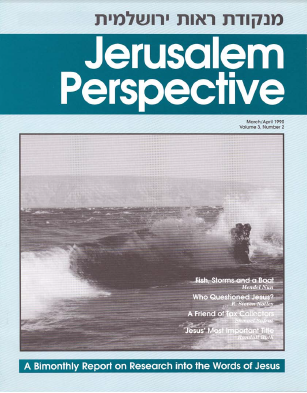Response revised: 6-Apr-2012
Question received from a reader in Huntsville, Alabama, U.S.A that was published in the “Readers’ Perspective” column of Jerusalem Perspective 25 (Mar.-Apr. 1990): 2.
I have noticed that you always seem to refer to the Old Testament as the “Hebrew Scriptures” or “Hebrew Bible.” Why do you avoid using the term “Old Testament” in your publication?
David Bivin responds:
It is not just in deference to Jewish sensitivities that we avoid “Old Testament,” but because we feel that for the Christian as well the term misrepresents the document. “Old Testament” seems to imply that the Jewish Scriptures have been replaced by the Christian New Testament, an idea that has led some Christians to conclude that the “Old Testament” is out of date and does not warrant as much serious study as the New Testament.
הַבְּרִית הַחֲדָשָׁה (haberit haḥadāshāh, the new covenant) is the term used in Hebrew today to refer to the New Testament. What Christians call the “Old Testament” is referred to in Hebrew as תַּּנַ״ךְ (Tanach, or Tanakh), an acronym based upon the first letter of Hebrew words for the three sections of the Jewish Bible: תּוֹרָה (tōrāh, Torah, Pentateuch), נְבִיאִים (nevi’im, Prophets) and כְּתוּבִים (ketūvim, Writings, Hagiographa).
The term “new testament” or “new covenant” appears in the New Testament in 1 Corinthians 11:25; 2 Corinthians 3:6; Hebrews 9:15; 12:24, and in some manuscripts of Matthew 26:28, Mark 14:24, and Luke 22:20, and seems to be a reference to Jeremiah’s prophecy that God would one day make a “new covenant”—בְּרִית חֲדָשָׁה (berit ḥadāshāh)—with the House of Israel and the House of Judah. The term probably should be translated “renewed covenant.” “Testament” in this context is a mistranslation of a Greek word, διαθήκη (diathēkē). This Greek word can be translated “will” or “covenant,” but its Hebrew equivalent, בְּרִית (berit, covenant), does not have this dual meaning. The word em>berit is one of the most frequently used words in Hebrew Scripture, appearing 270 times, and is one of Scripture’s most important concepts. “Testament” misses the connection with Jeremiah 31:31, and also may be misconstrued by the English reader to mean “testament,” in the sense of a “will.”
“New” also may give the wrong impression to the English reader. “Renewed” is probably nearer the original intent. If the New Testament references to “new covenant” refer to Jeremiah 31:31, then we are obliged to take into account the range of meaning of חֲדָשָׁה (hadāshāh), the Hebrew word translated “new” in that passage. Based on the meaning of its cognates in other ancient Semitic languages, the meaning of this word in Biblical Hebrew is “be or become new,” and also “renew.” In Hebrew, “new” can refer not only to something that has not existed before or is unfamiliar, but also to an existing thing that has undergone restoration or renovation. When this word is used in connection with buildings, for instance, it often refers to the renovation of an existing building, not the building of a completely new structure (cf. 2 Chron. 15:8; 24:4, 12). In English we speak of a new moon because the moon renews itself each month. Reflecting this fact, the Hebrew word for month, חֹדֶשׁ (ḥodesh) derives from the same root as חֲדָשָׁה (hadāshāh).
All this serves to illustrate once again how helpful it can be to get back to more Hebraic terminology and a more Hebraic perspective.
































































































